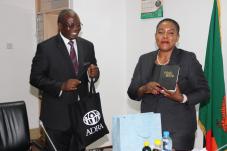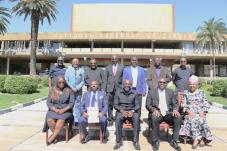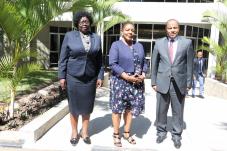- Home
- About Parliament
- Members
- Committees
- Publications
Statement on Parliamentarians as the Fourth Pillar for Achieving the 2030 Agenda: Population, Food Security, and Sexual and Reproductive Health (SRH)
9 August 2018
Accra, Ghana
Preamble
The year 2019 will offer an important opportunity to advance concrete action on the Sustainable Development Goals (SDGs) with the Tokyo International Conference on African Development (TICAD) and G20 Summit, both of which will be hosted by Japan. In addition, 2019 also marks the 50th anniversary of the United Nations Population Fund (UNFPA) and the 25th anniversary of the International Conference on Population and Development (ICPD). In anticipation of this commemorative year, we Parliamentarians working on the issue of population and development recommend to our fellow Parliamentarians, national governments, the international community and civil society, the following actions as constructive contributions:
Where as;
1. Population represents society which is the very agent to realize the SDGs. Building a society where no one is left behind is to ensure every individual who makes up its population can live with dignity;
2. Political will is necessary for achieving the SDGs. Parliamentarians have a role to play in giving shape to that political will through law making and allocation, oversight and monitoring of budgetary resources. In this regard, Parliamentarians, as the fourth pillar in the achievement of the SDGs, have a critical role to play together with national governments, the private sector and civil society;
3. Approaches to dealing with the issue of population cannot be forced upon individuals but must be based on their understanding and acceptance. As such, Parliamentarians have an important role to play in creating a viable plate form for community engagements; and
4. By the UNs projections Africa will account for more than 90% of the increase in world population by 21001, while Asia currently accounts for a majority of the global population. Making concerted efforts between Asia and Africa is key to achieving the SDGs.
Now therefore, we strongly support UNFPA’s new three transformative and people-centered results
and recommend as follows:
i. In order to achieve sustainable development, the mortality transition should proceed in tandem with the fertility transition. This requires promoting mortality transition by improving people’s health through measures to combat communicable diseases and expanding primary health care and promoting fertility transition by making comparable effort to ensure universal access to Reproductive Health (RH) services, as crucial components of Universal Health Coverage (UHC).
ii. Having zero unwanted pregnancies is essential for fertility transition, which requires achieving universal access to RH services. We urge fellow Parliamentarians to legislate measures that are needed in their countries and to allocate funding to this end. We also urge the international community to reinforce support in this area.
iii. In addition to further improvement in primary education, boys and girls should be given age appropriate comprehensive sexuality education, at the right time, based on accurate medical knowledge so that they can make responsible choices.
iv. To make the increasing population an engine for social and economic development, there should be active investment in youth education and training up to par with the acceptable global standards.
v. To eradicate gender-based violence and ensure respect for human rights of women and girls, eradicate discrimination and other maltreatment, enable women and girls to fulfill their potential to contribute positively to social development, it is imperative to place high priority on investment in youth education particularly for girls.
vi. As representatives of the people, Parliamentarians have a role to make known the people’s traditional knowledge and wisdom to the government and the international community. Parliamentarians should recognize the importance of traditional foods, such as indigenous crops, and utilize science and technology to improve and enhance its quality and quantity and call attention to the potential of such foods in order to ensure food security for the increasing
population.
vii. Countries without legislation for reporting Official Development Assistance (ODA) to their parliaments and also countries without sufficiently clear demarcation between their ODA budget and regular budget should take concrete steps towards achieving best global practices. Such efforts will promote mutual understanding between donor and recipient countries and improve Transparency, Accountability and Good Governance (TAGG), providing a foundation for further assistance for development.
viii. Such global partnership is premised on countries’ internal efforts to realize Transparency, Accountability and Good Governance. It is important for Parliamentarians to strengthen their unique role in exercising oversight over their governments to further enhance TAGG in accordance with their respective situations.
ix. As Parliamentarians, we urge our governments to prioritize SDG 3 and SDG 5 on Health and Gender respectively as well as adopt all international and regional policy instruments which are focused on improving the health and livelihoods of women.
Accordingly, to achieve the SDGs, it is essential for Parliamentarians to encourage inter-regional exchange, share information, and take stock of progress on population and development issues. For this purpose, it is important to promote Parliamentarians’ activities in which Parliamentarian groups in respective countries can actively engage. We urge the Asian Population and Development Association (APDA) and other independent public interest organizations to provide concrete evidence-based proposals in support of the activities of Parliamentarians.




